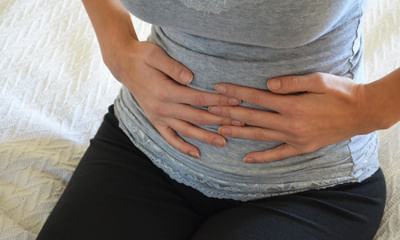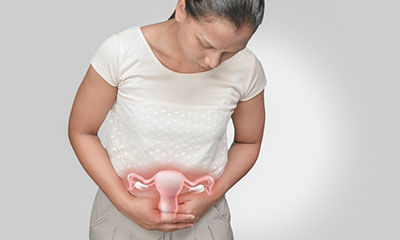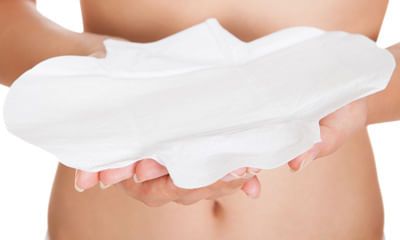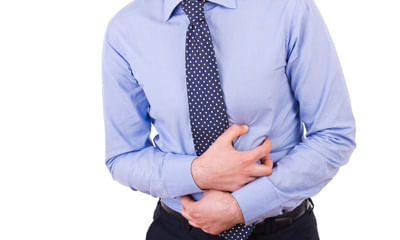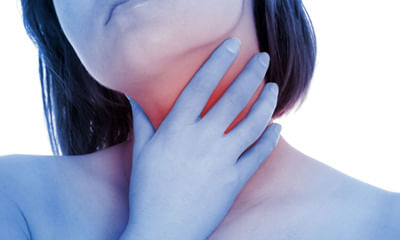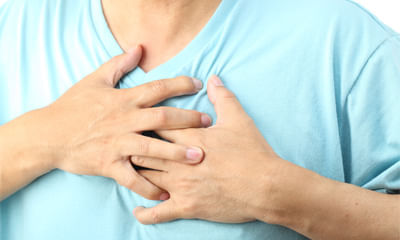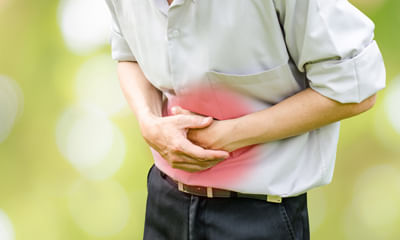Throat Burning During Pregnancy
Hello i'm b mukherjee. Age 29 yrs. I've esophagus motility disorder. I felt severe pain and burning sensation left side ...
Ask Free Question
I understand the complexity of your symptoms associated with esophagus motility disorder and functional heartburn. It's crucial to approach your condition comprehensively, considering your desire for pregnancy, here are few things to consider: medication management: esomeprazole 40 mg / esogress is a proton pump inhibitor (ppi) used to manage acid reflux. Its efficacy can vary among individuals. It's vital to adhere to the prescribed dosage and discuss any recurring symptoms with your healthcare provider. Lifestyle modifications: implement lifestyle changes to minimize acid reflux triggers. This includes avoiding large meals, acidic or spicy foods, and lying down after eating. Elevating the head of your bed can assist in reducing nighttime reflux. Dietary adjustments: collaborate with a dietitian to identify specific trigger foods and customize your diet accordingly. This can significantly impact the frequency and intensity of acid reflux and associated symptoms. Continuous monitoring: maintain a detailed symptom diary to track patterns, triggers, and medication effectiveness. Regularly share this information with your healthcare provider for informed decision-making. Pregnancy planning: it's commendable that you're considering pregnancy. Discuss your plans with your obs/gynaec doctor to explore acid reflux management strategies that are safe during pregnancy. They may recommend alternative medications or lifestyle modifications. Nasal and throat symptoms: mucus accumulation in the throat and nose can be associated with acid reflux. Ensuring proper acid suppression is crucial. Additionally, consider nasal saline irrigation to alleviate nasal congestion and mucus buildup. Ear, nose, and throat (ent) assessment: given the pressure and symptoms in your throat, nose, and ear, consider consulting an ent specialist for a comprehensive evaluation. They can assess for any structural or inflammatory issues contributing to your symptoms. Alternative medications or therapies: if esomeprazole alone is insufficient, your healthcare provider may explore alternative medications or therapies. This could include combining medications or trying different acid-suppressing drugs. Remember, managing acid reflux is a nuanced process, and individual responses to treatments vary. Regular follow-ups with your healthcare provider are essential to assess progress and adjust your treatment plan accordingly. If you have specific concerns or require further tailored advice, feel free to initiate a private consultation. Your well-being is paramount, and i'm here to support you on your health journey.
I am 21 years female I had burning stomach, burning throat and chest and increased heart beat. I had bloating and burpin ...
Ask Free Question
There is no need of surgery. Your burning and bloating are medical conditions. These conditions including your hiatus hernia can be very effectively treated by homeopathy. Homeopathic treatment is painless and safe. No side effects. You need comprehensive treatment and it takes some time. Please start taking homeopathic medicine, preliminary dose arsenicum album 200-once daily in the morning for 5 days. Book online appointment/consultation with me -(commencing from text consult rs 149, audio/phone-rs 300 and video- rs 400) for further more comprehensive prescription and treatment.
My wife is having pcos for the past 3 months. We r planning for a baby. Last mth she got her period 10 days late.in the ...
Ask Free Question
These symptoms are not diagnostic of pregnancy. U can do urine pregnancy test 10 days after missing her periods or beta hcg blood test as soon as she misses her period. In her case beta hcg blood test is more reliable.
Hello doctor. I'm a girl. Recently I'm getting sperm leakage from vagina. And I don't know what is the reason. Daily it' ...
Ask Free Question
Hello- You are suffering from White discharge/leucorrhoea is known as Shweta pradar in ayurveda and the major cause of it is mal nourishment of the body. You have to take proper care of your diet and your sleep to avoid discharge. 1) Avoid spicy diet and increase dairy products in your meals. 2) Take a sound sleep of at least 9-10 hour a day. 3) Use Shesham tree leave bark powder and use it 1/2 tsp twice. 4) Wash your vagina with alum (Fitkari) water daily. >Start this treatment and share you feedback on Lybrate.
Hi Sir, Somthig like White cotton cheese type is coming out from my vagina. From many days sometimes the quantity is low ...
Ask Free Question
Hi, Most of the time, vaginal discharge is perfectly normal. The amount can vary, as can odor and color (which can range from clear to a milky white-ish), depending on the time in your menstrual cycle. For example, there will be more discharge when you're ovulating, breastfeeding, or sexually aroused. There are some other vaginal infections that may also cause abnormal discharge. One that comes to mind known to cause a thick, white, chunky discharge (like a cottage cheese) is yeast infection. Other symptoms of a yeast infection are intense itching, swelling and pain around and outside of the vagina, or both. The discharge is often thick, white and, curd-like (almost like cottage cheese). The discharge will be odorless. Other signs are burning, redness, and irritation of the vaginal area. Yeast infections are usually caused by an overgrowth of a type of fungus called Candida, also known as yeast. Small amounts of yeast and other organisms are normally found in your vagina, as well as in your mouth and digestive tract. Yeast infections occur when the balance of organisms in your vagina is upset, and the amount of yeast grows too much, causing an infection. Yeast infections are most likely to be noticeable just before or just after your menstrual period. Some types of “yeast” infections are harder to treat and are caused by other species. Ask your health care provider (HCP) if you should be checked for the other types if your symptoms do not get better. This balance of organisms in your vagina can be changed by: Antibiotics (for acne, throat, ear infections, or even other kinds of vaginal infections) because they can kill the normal bacteria in your vagina and let the yeast grow Being overweight Diabetes Pregnancy HIV infection Steroids Birth control pills and other contraceptives Tight underwear made of material such as nylon or Lycra that traps moisture and heat, especially in the summer. (Cotton underwear is a good choice because it absorbs moisture better.) What are the signs/symptoms of a yeast infection? The most common symptoms of a yeast infection are itching and vaginal discharge. The discharge is often thick, white and, curd-like (almost like cottage cheese). The discharge will be odorless. Other signs are burning, redness, and irritation of the vaginal area. Severe yeast infections may cause swelling of the labia (lips) outside of the vagina. Sometimes, women have pain when they pee as the urine passes over the sore tissues. So once consult a doctor if you have any discomfort. Sexual intercourse may also be painful for women because of inflammation of the vagina.
Hi Sir, I had protected sex three weeks ago one day after my period ended and pretty sure nothing leaked. My husband din ...
Ask Free Question
You get urine for Pregnancy test to rule out Pregnancy. If it is negative then consult Surgeon and take medicines for pain abdomen, loose motion and vomiting.
I have acid problems. My stomach too much heavy after eat. My tummy always feeling like burning inside. Feeling suffocat ...
Ask Free Question
What you are having is Gastroesophageal reflux disease Gastroesophageal reflux disease (GERD) is a condition in which the stomach contents leak backwards from the stomach into the esophagus (the tube from the mouth to the stomach). This can irritate the esophagus and cause heartburn and other symptoms. Causes When you eat, food passes from the throat to the stomach through the esophagus. A ring of muscle fibers in the lower esophagus prevents swallowed food from moving back up. These muscle fibers are called the lower esophageal sphincter (LES). When this ring of muscle does not close all the way, stomach contents can leak back into the esophagus. This is called reflux or gastroesophageal reflux. Reflux may cause symptoms. Harsh stomach acids can also damage the lining of the esophagus. The risk factors for reflux include: Use of alcohol (possibly) Hiatal hernia (a condition in which part of the stomach moves above the diaphragm, which is the muscle that separates the chest and abdominal cavities) Obesity Pregnancy Scleroderma Smoking Symptoms can also be caused by certain medicines Common symptoms of GERD include: Feeling that food is stuck behind the breastbone Heartburn or a burning pain in the chest Nausea after eating Less common symptoms are: Bringing food back up (regurgitation) Cough or wheezing Difficulty swallowing Hiccups Hoarseness or change in voice Sore throat Symptoms may get worse when you bend over or lie down, or after you eat. Symptoms may also be worse at night. If you are overweight or obese, in many cases, losing weight can help. Avoid drugs such as aspirin, ibuprofen, or naproxen. Take acetaminophen to relieve pain. Take all of your medicines with plenty of water. When your doctor gives you a new medicine, ask whether it will make your heartburn worse. You may use over-the-counter antacids after meals and at bedtime, although the relief may not last very long. Common side effects of antacids include diarrhea or constipation. Other over-the-counter and prescription drugs can treat GERD. They work more slowly than antacids, but give you longer relief. Your pharmacist, doctor, or nurse can tell you how to take these drugs. Proton pump inhibitors (PPIs) decrease the amount of acid produced in your stomach H2 blockers also lower the amount of acid released in the stomach Anti-reflux surgery may be an option for people whose symptoms do not go away with lifestyle changes and medicines. Heartburn and other symptoms should improve after surgery. But you may still need to take drugs for your heartburn.
Hello doctor. Now I am 29 years old. Since 2 years I have throat problem. I have pain in throat and when I eat something ...
Ask Free Question
1.no alcohol 2. Reduce body wt 3. No smoking/ tobacco 4. Diet - no ghee/ butter, have mix of vegetable oils - mustard, til, ground nut, olive oil, have more green vegetables and fruits, have whole grain atta, no fried. Fast. Spicy / processed/ junk food. Less sugar, potato, rice 5. 30 mts brisk walk daily 6. Deep breathing exercise for 10 mts daily 7. Meditation daily for 10 mts. 6-8 hrs of sleep at night 8. Expose your body to sun for 15-20 mts daily after some oil massage to get vit d. 9. Take more water- proper hydration. For medicine contact on private chat.
My age is 22 year. 4-5 month ago I have erosive gastritis .I am feeling pressure and pain in mid upper chest. I went to ...
Ask Free Question
What you are having is Gastroesophageal reflux disease Gastroesophageal reflux disease (GERD) is a condition in which the stomach contents leak backwards from the stomach into the esophagus (the tube from the mouth to the stomach). This can irritate the esophagus and cause heartburn and other symptoms. Causes When you eat, food passes from the throat to the stomach through the esophagus. A ring of muscle fibers in the lower esophagus prevents swallowed food from moving back up. These muscle fibers are called the lower esophageal sphincter (LES). When this ring of muscle does not close all the way, stomach contents can leak back into the esophagus. This is called reflux or gastroesophageal reflux. Reflux may cause symptoms. Harsh stomach acids can also damage the lining of the esophagus. The risk factors for reflux include: Use of alcohol (possibly) Hiatal hernia (a condition in which part of the stomach moves above the diaphragm, which is the muscle that separates the chest and abdominal cavities) Obesity Pregnancy Scleroderma Smoking Symptoms can also be caused by certain medicines Common symptoms of GERD include: Feeling that food is stuck behind the breastbone Heartburn or a burning pain in the chest Nausea after eating Less common symptoms are: Bringing food back up (regurgitation) Cough or wheezing Difficulty swallowing Hiccups Hoarseness or change in voice Sore throat Symptoms may get worse when you bend over or lie down, or after you eat. Symptoms may also be worse at night. If you are overweight or obese, in many cases, losing weight can help. Avoid drugs such as aspirin, ibuprofen, or naproxen. Take acetaminophen to relieve pain. Take all of your medicines with plenty of water. When your doctor gives you a new medicine, ask whether it will make your heartburn worse. You may use over-the-counter antacids after meals and at bedtime, although the relief may not last very long. Common side effects of antacids include diarrhea or constipation. Other over-the-counter and prescription drugs can treat GERD. They work more slowly than antacids, but give you longer relief.
I have Chronic cough and acid reflux and unable to eat and drink since one month even heart burn throat burn chest pain. ...
Ask Free Question
What you are having is Gastroesophageal reflux disease Gastroesophageal reflux disease (GERD) is a condition in which the stomach contents leak backwards from the stomach into the esophagus (the tube from the mouth to the stomach). This can irritate the esophagus and cause heartburn and other symptoms. Causes When you eat, food passes from the throat to the stomach through the esophagus. A ring of muscle fibers in the lower esophagus prevents swallowed food from moving back up. These muscle fibers are called the lower esophageal sphincter (LES). When this ring of muscle does not close all the way, stomach contents can leak back into the esophagus. This is called reflux or gastroesophageal reflux. Reflux may cause symptoms. Harsh stomach acids can also damage the lining of the esophagus. The risk factors for reflux include: Use of alcohol (possibly) Hiatal hernia (a condition in which part of the stomach moves above the diaphragm, which is the muscle that separates the chest and abdominal cavities) Obesity Pregnancy Scleroderma Smoking Symptoms can also be caused by certain medicines Common symptoms of GERD include: Feeling that food is stuck behind the breastbone Heartburn or a burning pain in the chest Nausea after eating Less common symptoms are: Bringing food back up (regurgitation) Cough or wheezing Difficulty swallowing Hiccups Hoarseness or change in voice Sore throat Symptoms may get worse when you bend over or lie down, or after you eat. Symptoms may also be worse at night. If you are overweight or obese, in many cases, losing weight can help. Avoid drugs such as aspirin, ibuprofen, or naproxen. Take acetaminophen to relieve pain. Take all of your medicines with plenty of water. When your doctor gives you a new medicine, ask whether it will make your heartburn worse. You may use over-the-counter antacids after meals and at bedtime, although the relief may not last very long. Common side effects of antacids include diarrhea or constipation. Other over-the-counter and prescription drugs can treat GERD. They work more slowly than antacids, but give you longer relief. Your pharmacist, doctor, or nurse can tell you how to take these drugs. Proton pump inhibitors (PPIs) decrease the amount of acid produced in your stomach H2 blockers also lower the amount of acid released in the stomach Anti-reflux surgery may be an option for people whose symptoms do not go away with lifestyle changes and medicines. Heartburn and other symptoms should improve after surgery. But you may still need to take drugs for your heartburn.


